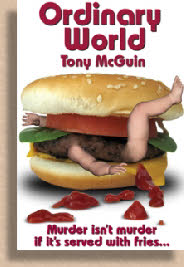

Site, content, and design © LL-


Ordinary World by Tony McGuin ISBN: 9781905091133 (Paperback) 9781905091294 (Digital ebook)
Available formats: Paperback, PDF, PRC, ePub, HTML, MSWord
“A modest proposal for the 21st century…”
This is the future.
Democratic institutions in the West have collapsed under the weight of the public’s fear of terrorist attack. In uncertain times what people crave is the firm smack of fatherly dictatorship and the Church has stepped in to ensure a firm smack is exactly what the people get.
A world now betrothed to organized religion has nevertheless allowed big business
to become even more debauched. GORDON A. GARGOYLE, owner of Recovered Unwanted Meat
Deals, (RUM Deals) UK, a manufacturer of reprocessed meat run-
TOHON SEHSA finds himself twisting in the financial clutches of his distressingly
pregnant ex-
Tohon, with the help of his colourful friend BOATER, a man of complicated personal history, take jobs at the hellish foetus burger factory in an effort to pay her off.
Meanwhile, Gargoyle and Mary have quietly agreed to publicly sacrifice her new-
Can anybody stop this? Well, with the seemingly random interventions of our two desperate
friends, a child-
Mornings are hateful.
Afternoons are quite pleasant.
It’s just another day in an Ordinary World.
$14.99
£9.99
$3.99
ebook
Instant
download
Prologue
God is definitely an Englishman.
Sure, Jesus might be some foreign bloke with a stagey beard and some lefty views that are, frankly, a bit embarrassing, but God—the Big Man—is definitely English.
You can tell He is by the way the world is so poorly managed and maintained: bits
buckle, stop working, or vanish all together. The English have never understood the
concept of service and subsequently anarchy breaks out almost everywhere. In true
English style, the problems are largely ignored or patched-
“So, why,” they say, “is there so much misery in the world, oh Lord?” Or, “We are good people who live the right way but bad things still happen to us all the time. How can this be fair, Your Worshipfulness?”
In answer to all of these desperate and heartfelt pleas for knowledge of the world, an understanding of the fragility of existence and an appreciation of the countless terrors that abound mankind, they receive a cold and stony silence . . . and then maybe a devastating flood to keep everyone on their toes.
If this isn’t the sign of an English God, you’d have to doubt if He existed at all.
However, even God will occasionally look down on Creation and witness what was once a green and healthy planet has dissolved into a grey and fetid pool of seething hatred and wonder where it all went wrong. God knows His first mistake was making “Man” in His own image, which meant more than just bestowing a passing likeness, but endowing men and women with His own characteristics.
Unfortunately, God is painfully aware that He isn’t quite as grand as His PR machine
would have us believe. It’s all very well giving it, “Thou Shalt Not this,” and “Honour
Thy God that,” but, as divine beings so often prove to be, He is as disreputable
and shifty as a builder bogged-
God watches His greatest creation piss in the water supply and fog the air with pollution and feels guilty for working away from home so much. He worries that He has abandoned His loved ones and allowed them to pretty much bring themselves up when they sorely needed His guidance and support. But what can He do? He’s just God. Right? Right?
History, some will tell you, thunders down the straight track of cause and effect relationships. One thing pretty much leads to another and spotting the joins can be a thankless task. However, closer inspection proves that while History may indeed be about cause “A” bringing about effect “B,” how these things lead up to each other is never all that straight a line. Instead, History gambols along like a small puppy gamely chasing a butterfly, blissfully unaware that it’s about to vanish over a cliff. It is this ability of History—to take dramatic and unexpected directions—that keeps life, as a whole, vaguely interesting but, in the main, appalling.
Take, for example, September the Eleventh, 2001. For some, that was the day the world changed. People point to the events of that day and say, “Well, because of September the Eleventh, I haven’t been able to travel on a plane since.” Or, “Because of September the Eleventh, your insurance has gone up as your house may be destroyed in an act of terrorism and we don’t want to give you any money if it does because you should take reasonable steps to prevent global terror.”
But for others, that fateful day was the starting point for the East and the West to fragment disastrously and to believe that everyone “foreign” was a threat to everyone “not foreign.” Soon the world took on the look of a saloon bar in a Western film where somebody has just accused someone else of cheating at cards and a glass of whiskey has been thrown in someone’s face. In short, you know what happens next will be short, loud—and badly acted.
Therefore, this story is about what happens in the future, and it is an unspecified future, but it is one that can be traced if one follows the wobbly line of history as it staggers away into uncertainty.
It is exactly this kind of elasticity that allows some very peculiar events to unfold.
Let’s assume that History tells us that September the Eleventh, and all the sorry wars and tensions that were fought after it, resulted in a new rise of religious fervour in the West. Christianity finally had its “Second Coming,” this time without all that messy Son of God business that had buggered it all up last time.
The Church took hold of people’s minds again. As far as could be ascertained from
the newspapers and television pundits that filled the airways of the West, Islam
had enslaved the East with a straight jacket of illiberal, regressive thinking and
that every God-
In America, where fundamentalist religious dogma was never that far away from the
political surface, it wasn’t long before the radical, but misguided, clerics of the
East found themselves facing a growth of old-
Almost without challenge the “free world” shut down to democracy and settled instead
for a more certain, and less changeable, theocracy that ruled with an iron grip on
the hearts of its subjects and crushed dissent and alternative lifestyles with the
well-
God was back . . . and this time He was pissed off.
The West’s fragile democratic institutions soon crumbled in the face of spittle-
It all sounds incredible and unlikely, doesn’t it? But, if you had a distant enough vantage point and a brain like a jelly jigsaw, you would be able to see how such things could happen. People were using God to justify behaving like humans. Even an English God will take exception to that. It’s enough to force Him to put down His warm beer, fold away His newspaper, take a deep, weary breath . . . and exact a terrible revenge.
Want to read more now, don’t you? Download sample chapters, free!
5 stars by Geoff Nelder
Rarely do I find a novel that so well mixes the vile and sublime. Unlike Joseph d'Lacey's macabre novel, Meat, where readers slowly realize the full horror, the reader of Ordinary World knows from the cover art and blurb that human flesh is offered as food. Not just any human, but aborted foetuses. Set in the future, after social and administrative breakdown and reconstruction on more survivalist tenets, there are some individuals set to rebel against eating babies, especially when they discover that laws are being prepared to extend abortion to a year after birth. This is bound to shock sensitive readers though a running joke in Education is that some teachers would like abortion to be extended to 16 years after birth!
Ordinary World emerges from the same publishing house, LL-
The writing style is lyrical in places even through the sludge of the context. For example the backstreets are described as a `string vest of alleys'; Tohan and his `boiler room of a brain'; Hilda, Anthony's car, `was good for getting from "A to B" with the ladies too.'; `cats only put with humans until they find a way of farming their own sparrows'; the car drove onto the drive creating `a rainbow of gravel like synchronised divers'.
Speaking of the car, Hilda is one of three non-
At times I felt that some characters' names were OTT silly -
Some writing conventions are thrown aside in this novel -
There are many unusual aspects of a noir adventure in this novel, none more so than
the intriguing conclusion, which in some ways I'd like to have seen developed more.
Perhaps there'll be a sequel exploring a world even more extra-
5 stars by Mark Jackman
There is one amazing revelation that everyone who reads Ordinary World, by Tony McGuin, will experience, and that is the concrete certainty that there is someone out there with an imagination more f**ed up than anyone the reader knows, even 'Funny' Uncle Trevor, who your Mum would never allow near you, unsupervised. In fact, a rumour passed my way that Joseph Fritzel finished reading the story, just before his trial, and announced "Tony McGuin, there's a man who isn't afraid of a little controversy." I first read the blurb on the back of the cover, and thanked God. I had finally discovered an author who shares his thoughts with a more demented demon than my own (Rory).
Right now, you are wondering to yourself what can possibly be so disgusting that it warrants the use of Joseph Fritzel's name in the opening paragraph of a review (which is probably a world first, I might add) so I am going to hit you with it, hard and fast: In Ordinary World, someone wants to open a fast food chain that sells burgers that have been made from aborted human foetuses.
Yes, you did read that correctly (unless I spelt foetuses wrong).
The story centres around Tohon Sehsa and Boater, two of the most unlikely heroes
that you will ever meet. Actually, they are not heroes, not in the slightest, and
McGuin never makes them out to be anything else. The classic combination of a tall,
thin guy and a short, fat bloke has been used countless times before, but not like
this. Never have they been murdering, scheming, drunken, woman-
So in a book about eating foetuses, and murdering, drunken heroes, what the hell
are the bad guys like? The funny thing is, again, there is something likable about
all the characters that McGuin creates. There is always something quirky or intriguing
about some of the most despicable villains to ever walk the pages of morality. Even
the priests with questionable ethics fiddled their ways into my heart. Why does McGuin
get away with it? The explanation is simple: this book is laugh-
Before you throw-
Yes. It gets worse.
I can't divulge anymore, as I want you to experience the emotional roller-
Ordinary World: A title that can only be appreciated once you have turned the final page.






